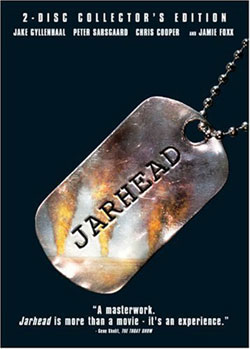 You could possibly relate Jarhead to William Broyles Jr’s biggest success, Cast Away. After all, Jake Gyllenhaal plays a lonely man stranded in a sandy landscape, yearning for home. That would make Peter Sarsgaard Wilson, by the way.
You could possibly relate Jarhead to William Broyles Jr’s biggest success, Cast Away. After all, Jake Gyllenhaal plays a lonely man stranded in a sandy landscape, yearning for home. That would make Peter Sarsgaard Wilson, by the way.
Broyles brings something unique to Jarhead, though, and that’s his own real life experience as a Marine in Vietnam. That obviously gave the screenwriter a foot up when adapting Anthony Swofford’s memoir for the screen. Last week I had a chance to get on the phone with Broyles, in anticipation of today’s DVD release of Jarhead, which includes a commentary track with him and Swofford.
Q: When you’re adapting a book like Jarhead, how closely – or at all – do you work with Anthony Swofford?
Broyles: If you’re lucky, like I was, I get to work with the author very closely. Tony was just a pleasure to work with. Often the better the book the harder it is to make into a screenplay, and this was a really good book. It really captured the voice and the mood of a young man, his family history, his military experience, his experience after the war, and did it with a very convoluted narrative. It was a great book, and everything that made it a great book made it hard to do as a movie, so it was great to have Tony as a helper along the way. When I got to various crossroads, Tony was always there to help me out.
Q: When you’re adapting Tony’s story was it hard for him to deal with changes being made to make the film more cinematic and dramatic, or was he ok with that?
Broyles: It’s funny because I said, ‘You know, I’ve had experience with this before, Tony, but you have to get used to the fact that there’s going to be a character named Swoff that’s the star of a movie that you think is you but isn’t going to be you at all. He’s going to be played by an actor and written by me, and you’re sort of going to have to let go.’ He said, ‘Everybody calls me Tony now, and that kid Swoff, he doesn’t exist anymore except in that book. I think I can do it.’ He was real good about it. I think getting played by Jake Gyllenhaal – there are worse things that can happen to you.
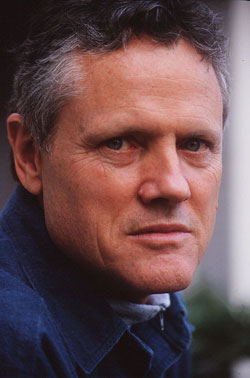 Q: I noticed how in the commentary track he keeps referring to the character as ‘Swoff’ and never as ‘me.’
Q: I noticed how in the commentary track he keeps referring to the character as ‘Swoff’ and never as ‘me.’
Broyles: He was a different person writing the book. He had the maturity to write about it. And he also had the wonderful quality of the honesty to portray himself as he was then, not as he might like to think he was. The messy, rough edges that a 20 year old might have – he really captured that. It’s what I loved about the book.
Q: Was there ever a concern that this story, about guys never going into combat, would appear trivial today when so many of our soldiers are dying or being crippled in actual combat right now?
Broyles: Not really for me. I just thought that every story has so many sides, and every war has so many pieces. Every war is different for everyone who fights it. The experience he had through the process of becoming a Marine, wanting more than anything else, to fire his rifle and not getting to, to me is a story that is universal and timeless. It happens to be coming at a time when all too many young Americans are getting to fire their rifles, but the frustrations they feel and the dangers they face, although they’re very different specifically than the first Gulf War, the experience of being in the military, the waiting, the bonding, the loneliness, the importance of your girlfriends and wives back home – the personal part of being a soldier or a Marine overseas in wartime isn’t just about bang bang, shoot em up all the time. Those are the exceptional moments that you never forget, but the reality of most of the time is you’re with your buddies, you’re waiting, you’re lonely. Those qualities I think Jarhead captures better than any movie than I’ve ever seen, because of Tony and how he portrayed it in the book.
Q: Based on your own experiences in the military, what are the differences between today’s Marines and those of the Vietnam era?
Broyles: That’s a really good question. I think in part one difference is that the Marines today know about the Vietnam War. It’s part of their mythology and history just as it was for the characters in the movie. The characters in Jarhead, they watch Apocalypse Now before going off to war.
Interestingly, I think Vietnam is probably more like what is going on today than the first Gulf War was. It’s a war where you don’t know who your friends are, you can’t quite trust anyone, you’re never safe, the political situation is confusing, the goals aren’t clear. You’re in this very kind of existential situation where you don’t know whether you’re doing something good or not, whether what you’re doing is making a difference or not, so all you can do is really be true to your buddies and do the best at your job as you can. That’s also central to what happens in Jarhead, too. It’s what happens in most wars, with the exception of World War II, which had a clarity that the wars since haven’t.
Q: Do you think it affects Marines in a different way than it did you in Vietnam? Back in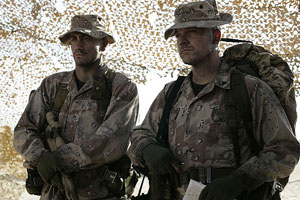 Vietnam there was the memory of a good war, it was a worthy war. Today it’s hard not to see the parallels with Vietnam. Do you think that affects the mindset of the Marine on the ground today?
Vietnam there was the memory of a good war, it was a worthy war. Today it’s hard not to see the parallels with Vietnam. Do you think that affects the mindset of the Marine on the ground today?
Broyles: I’m sure it does, but you also have to look at how there are many Vietnam wars, because it lasted so many years. This war is in its fourth year, and the experience of the Marines who were there at the beginning, rolling towards Baghdad, toppling Saddam Hussein, is very different from the Marines who fought in Fallujah last year, or who are there now. It’s a moving target, but what’s the same is that these are kids – men and women – who are willing to sacrifice for their country. Again, that’s what you see in Jarhead, you see the feeling these guys have of being completely on their own, that no one understands what they’re going through and they can only count on each other. That kind of a bonding they have in their tent in Jarhead, is universal. I guarantee those kinds of scenes are going on right now in Iraq.
Q: Your son was in the Marines?
Broyles: No, he was a pararescue jumper in the Air Force. They’re like a Navy SEAL, but they’re rescue. He did three tours of Iraq, and he got back from his last tour the day Jarhead opened and he and his team went straight from the airport with their duffel bags to the movie theater to watch Jarhead. And they loved it, so far as it’s capturing the small community of elite military guys, which they were. They thought Jarhead did it better than anything they had ever seen.
Q: That’s a great compliment.
Broyles: It couldn’t be harder to earn or more appreciated than coming from guys like that. They really walk the walk.
Q: What do you have coming up next? Are you working on anything right now?
Broyles: I’m doing this thing called Shadow Divers. It’s about two working class divers from New Jersey who find a WWII U-Boat off the coast of Jersey that no one knows is there. They spend the next seven years trying to figure out what U-Boat it is and who is onboard. Over the course of that their marriages fall apart, people die, but they just keep this obsession and get really close in the process of doing it. That’s just going off to directors very shortly, we’ll see what happens.
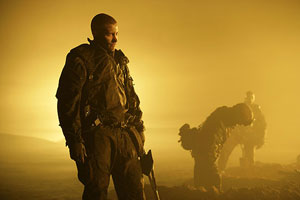 Q: Ridley Scott was involved with that at one point, right?
Q: Ridley Scott was involved with that at one point, right?
Broyles: That’s right, he was, but he went off and made a movie, A Good Year. So anyway, I think Ridley and Fox mutually agreed that we didn’t want to wait on Shadow Divers while he did that. But he may come back – the way Hollywood works, nothing is ever permanent until the airplane edition goes on the screen.
Q: That must be frustrating. Speaking of frustrating, one of the things I am always fascinated by with screenwriters is how you have chosen to work in such a collaborative medium, where what you write may never actually end up on screen as you wrote it.
Broyles: It’s wonderful and it’s terrible. I feel really lucky that I actually get to see the things I do on the screen. But in a lot of ways it’s like raising children for adoption – you have to love them and care for them just to give them away to the director and of course the actors, who then go and say the lines and bring the thing to life. But for whatever frustrations there are it’s a wonderful thrill on the first day when you go to the set and see all the trucks and the trailers and all the people and the actors and it all comes from you sitting there in your t-shirt at the word processor. That’s the reward. I regard it as a really interesting process where you deal with a lot of amazing, creative people and get ideas and go places you never could have gone on your own.
Q: A lot of my readers are aspiring filmmakers and screenwriters. Do you have any advice for young screenwriters?
Broyles: I thing the thing is, a, don’t give up. And b, find something you’re passionate about and that you have a relative advantage on, that you know more about and you’re more interested in and write about that. And c, don’t fall in love with your own words. That’s a common mistake, where writers will finish a script and think, ‘God, this is perfect. They should film it just the way it is.’ That’s not how, in my experience, screenwriting works. It’s an endless process. I go through draft after draft after draft before I show it to the first person, and then I go through more. You have to commit to the ride and not to the destination.
Q: Is there directing in your future?
Broyles: No, because I have five kids. I like the writer’s life a lot because it lets me stay home. If you’re going to be a director you pretty much commit a year or two years of your life around the clock to your film. I could not admire the men and women who do that more, or enjoy their company and working with them. But I like going home with them at night.
If I could just make a pitch, one of the things that I think is so great about this DVD is that Tony Swofford made a documentary that’s called Semper Fi that’s on it, and it’s about these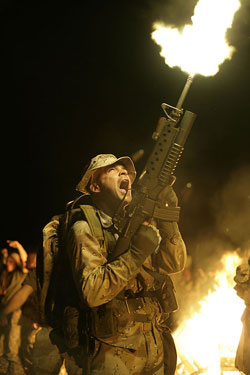 Marines that come back from the war and it’s amazing.
Marines that come back from the war and it’s amazing.
Q: I interviewed two of the Marines from that documentary.
Broyles: Good. I didn’t want to let the interview go by without mentioning that. That’s part of what we wanted the movie to do, to give us the opportunity to really deal with the real people.
Q: I thought it was really impressive, that it wasn’t just fluffy behind the scenes stuff.
Broyles: I think even the behind the scenes stuff was interesting, in the way that Sam gave the actors their cameras, and the whole thing on the extras I thought was really interesting. To me, I get so bored with the usual features – you talk to the director, you talk to the actors, they talk about how wonderful the film was. This was a real expansion of the movie experience as opposed to just a commentary on it.
Q: The extras documentary has that one scene where one of the extras actually gets called up for active duty and they have the big goodbye for him – it was so touching.
Broyles: It’s so unexpected. I was very moved by the material on the DVD. I saw it all recently myself, and I thought this was really quite amazing.
Which guys did you talk to?
Q: The two New York guys.
Broyles: Angel, wow. The look on his face, and talking about what his future is and just being home – oh, man. That is so universal. That could have been said by some of my Vietnam buddies, and I’m sure by some WWII guys.